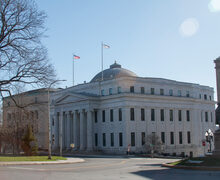Beckley-Forest: Pope’s call for climate action won’t influence Republicans
When the pope says something, it carries moral and spiritual weight. Now, after Pope Francis’ recent trip through Washington, he’s pushing to carry weight in the political discussion of climate change as well.
The pope’s pronouncements during his trip addressed the injustices of economic inequality, exclusionary immigration policies, the refugee crisis and abortion. However, the pope’s main concern seemed to be the threat of human-caused global climate change.
Francis’ environmentalist stance has irritated many congressional Republicans, some of whom have publicly insisted he stay in his lane and out of politics. One lawmaker even vowed to boycott the pope’s historic speech to Congress when he heard it would address climate change. This defensiveness shows just how entrenched some Republicans’ resistance to climate action is and how unlikely they are to budge on the issue.
It’s a matter Pope Francis has approached on the world stage before, including in his environmentally-themed encyclical “Laudato Si’,” in which he writes that our “structurally perverse” economic system is not only exploiting the poor, but turning the Earth into “an immense pile of filth.”
While Pope Francis’ positions have generally aligned with the American left, his emphasis on climate change action is one of his most urgent calls, directly engaging a rhetorical and legislative battle that’s raged in American politics over the last several years.
On one side are droves of scientists, environmental activists and Democratic politicians who have regarded this issue as a possibly existential threat, moving to ban high emissions and phase out of the fossil fuel industry.
On the other side is a mass of Republican politicians, who support their positions by citing state’s rights, free enterprise or even scripture. Sometimes, as in the case of the Sen. Jim Inhofe (R-OK) and others among the religious right, they outright deny that humans are affecting the climate at all.
While Inhofe has been quoting Bible verses and speaking in Congress to “expose” climate change as a hoax, he’s also received over $1,189,000 in campaign cash from oil and coal industries since 1999. The vested interests of the fossil fuel industry provide Inhofe and other politicians in his corner with powerful ulterior motives to resist policies that restrict those industries.
However, casting anti-climate politicians as just the cash-hungry minions of the fossil fuel industry is an oversimplification.
In Oklahoma, the Kentucky hills and other regions of the U.S., oil and coal companies are huge employers. Restrictions imposed on the industry can directly threaten the livelihoods of these politicians’ constituents.
The cruel truth is that these working-class communities will suffer from emission-cutting regulations. While some Republicans have been decried for brazenly defying what some perceive as an urgency to protect our environment, it’s easy to see where they’re coming from.
However, even this defense of the fossil fuel industry is ultimately shortsighted. A shift toward new-energy industries could help re-employ those left out in the cold by the necessary regulation and eventual phasing-out of the industry. But options like these can’t be fully explored while Republicans resist addressing the issue to protect their constituents’ short-term well-being.
In asking our leaders to consider the long-term impacts of climate change, Francis and other reformists are asking for a change in political culture, which may not be possible until the reality becomes too grim to deny any longer.
Thomas Beckley-Forest is a sophomore newspaper and online journalism major. His column appears weekly. He can be reached at [email protected].
Published on September 28, 2015 at 11:57 pm





